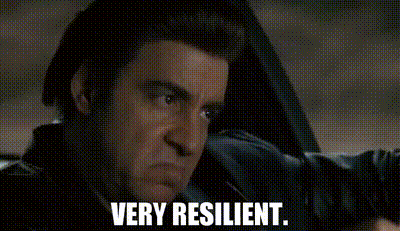There are certain clichéd phrases in job advertisement which are worth watching for, as they can be indicative of underlying challenges within an organisation. For instance, “Thrives in a high-pressure environment” (why so much stress?), or “is always willing to go above and beyond” (why aren’t expectations being managed?)
But when we talk about ourselves on our CVs, or have conversations with recruiters, we can often fall foul of similar traps when describing ourselves. While we’ve (mostly) stopped telling people that our greatest weakness is that “I’m a perfectionist”, people are increasingly using another word to describe their working style: resilient.
True resilience vs avoidable resilience
Resilience is defined as “the capacity to recover quickly from difficulties”, and it’s a toughness that we’ve all had to develop during COVID times. If anything, we perhaps don’t give ourselves enough credit for fumbling our way through a pandemic; the number of people that I’ve coached who tell me that they “didn’t really achieve much” while under enforced lockdown is incredibly surprising. This is an example of true resilience: there’s no manual for how to survive a pandemic. (Well, there wasn’t. I daresay there are hundreds now.)
However, in the workplace, often our battles against adversity are potentially avoidable, and can lead to workplace toxicity. For instance, a team which develops resilience against unrealistic deadlines (a closed group which “knuckles down” and gets the job done) risks being exploited again in the future. This is especially evident in the gaming industry, where so-called “crunch periods” (where teams are asked to deliver a fixed set of features, to a fixed quality, within a fixed deadline) are seen as part-and-parcel of the job, and even romanticised an alarming amount - especially by those who aren’t caught-up in them. All-night pizza parties are fun when you’re a teenager, but less appealing when you’ve not seen your children for three weeks straight.
Surfacing adversity
If continually tolerating difficulties won’t solve the problem, then the alternative is surely obvious: we should escalate the problem to our manager (and their manager, if necessary) in an attempt to solve the situation. Self-organising teams should be capable of doing this by reflecting during an agile retrospective, or adjusting the work that they commit to within an iteration. And if the organisation itself won’t solve the problem, shouting louder can help; going back to the aforementioned gaming example, we’re seeing more and more large companies being publicly outed by employees for their toxic working practices.
But what if your manager is your adversity? Again, hopefully there are reporting lines, HR practices, and mental health professionals within your organisation who can help to correct this, often in an anonymous and confidential fashion. However, all processes are fallible: I once worked in a team under a tempestuous boss, whose attitude and temper we were basically told to tolerate (to the extent that someone’s formal complaint went unaddressed). People left. Others simply retreated into themselves, or stopped performing entirely. If you were in a relationship with somebody who was treating you this way, your friends would be staging an intervention.
Sometimes, you just need to vote with your feet, and seek out a healthier working environment with a more supportive team. And when you seek out that role, don’t let it be seen as a “lack of resilience” that led to your change - you had a self-awareness which allowed you to take decisive and necessary action to ensure your ongoing success. Let’s start talking more about this, rather than our ability to absorb pain.
Key takeaways 📝
- What doesn’t kill us, won’t necessarily make us stronger.
- Unchecked adversity leads to exploitation, declining morale, and weaker team bonds.
- Rather than developing greater resilience, let’s learn to push back against the adversity.

